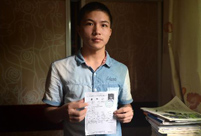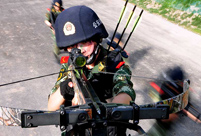 Global ambassadors of ecotourism gather in Nanjing
Global ambassadors of ecotourism gather in Nanjing
 Taiwan woman marries into Kazak family, 100 sheep plus a flat as dowry
Taiwan woman marries into Kazak family, 100 sheep plus a flat as dowry
 College girls take graduation photos under water in Chongqing
College girls take graduation photos under water in Chongqing
 Cartoon: Xi and football
Cartoon: Xi and football
 Chinese influence sweeps ROK
Chinese influence sweeps ROK
 Post-90s beauty boxer grapples four men
Post-90s beauty boxer grapples four men
 3,000-year-old tea town through lenses
3,000-year-old tea town through lenses
 22 archaeological sites along Silk Road in China
22 archaeological sites along Silk Road in China
 Football babies, Samba dancers embrace 'World Cup'
Football babies, Samba dancers embrace 'World Cup'
 Beautiful scenery along China’s Grand Canal
Beautiful scenery along China’s Grand Canal
July 7 marks the 77th anniversary of the Marco Polo Bridge Incident, also known as the Lugou Bridge Incident or July 7 Incident. We commemorate this day because we should remember history and cherish peace. However, Japan's leaders have obviously forgotten their country's history. They have determined to change the path of Japans' post-war development and challenge the post-war international order.
After Japanese Prime Minister Shinzo Abe came to power, he first challenged China's sovereignty on the Diaoyu Islands, then visited the Yasukuni Shrine, and went on to question the Kono Statement, an official apology made by then Japanese chief cabinet secretary Yohei Kono in 1993 which acknowledged that Japan was involved in forcing more than 200,000 women to serve in military brothels. Recently, Japan's Cabinet has passed a resolution to lift Japan's ban on collective self-defense rights. All these moves have aroused the concerns of neighboring countries.
Collective self-defense means that when a member country of an alliance is attacked, even if the other countries of the alliance are not under attack, they are permitted to conduct military operations to aid each other.
So why does Japan, as a sovereign country, have no right to collective self-defense? The reason is that after Japan's defeat, it was required to undergo demilitarization, as provided for in the pacific constitution.
But the United States has lobbied for Japan to lift the ban. When it signed its security treaty with Japan, the U.S. already intended to amend the security treaty to one of mutual cooperation and security, that is, one under which the U.S. and Japan can aid each other.
But for the sake of economic development, the then Prime Minister Shigeru Yoshida rejected the idea of America and till 1960 when Japan and the U.S. modified the old security treaty, the Prime Minister Nobusuke Kishi, the grandfather of Abe and also the class-A war criminal, did not accept the US requirements to made a two-way security treaty.
The one-way security treaty remains in force today, although the United States has regularly demanded that Japan take on a greater share of its “international obligations” and Japanese right-wingers have also used all sorts of pretexts to break free from the limits of the pacifist constitution and deploy troops overseas.
Nowadays the cold war has ended and the United States is at less risk from other countries. Does the United States really need Japanese help to support its own defense? Obviously not.
What the United States needs is Japan's help to attack others. From the Korean War through the Vietnam War and the Afghanistan war to the Iraq war, the United States is ever the aggressor. And the Abe's government's intention to lift the ban on collective self-defense is clearly an aggressive move.
In addition, according to the Japanese cabinet resolution, Japan will exercise its right to collective self-defense not only on behalf of allies, but also on behalf of "countries closely associated with Japan". This goes beyond anything that is permitted in the provisions of the charter of the United Nations, and it increases the risk that Japan to will resort to force. Japan's neighbors should be on their guard.
The author is Zhang Jian, dean of Tianjin Academy of Social Science.
 'Seattle's soulmate' - -Pike Place Market
'Seattle's soulmate' - -Pike Place Market Human skeletons of more than 1,600 years old
Human skeletons of more than 1,600 years old BFA goddess poses for graduation photos
BFA goddess poses for graduation photos Separate college entrance exam
Separate college entrance exam Flash mob dance
Flash mob dance Featured hutongs in Beijing
Featured hutongs in Beijing Picturesque scenery of Ghost City
Picturesque scenery of Ghost City Female special assault team in training
Female special assault team in training Children attend First Writing Ceremony
Children attend First Writing Ceremony Chengdu police use social media to boost recruitment
Chengdu police use social media to boost recruitment Secrets unveiled in restoration of the 800-yr-old Buddha
Secrets unveiled in restoration of the 800-yr-old Buddha Heavenly path in Chongli grassland
Heavenly path in Chongli grassland Happy Birthday to "Yuanzai"
Happy Birthday to "Yuanzai" China's manned submersible Jiaolong opens to public
China's manned submersible Jiaolong opens to public Roast Duck Restaurant celebrates 150th anniversary
Roast Duck Restaurant celebrates 150th anniversaryDay|Week|Month